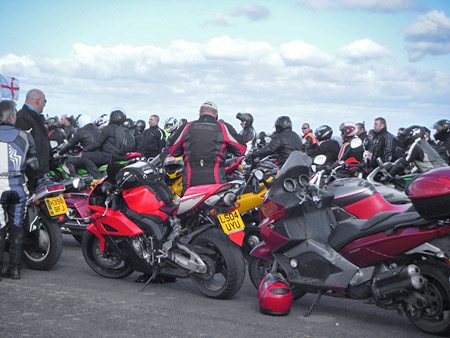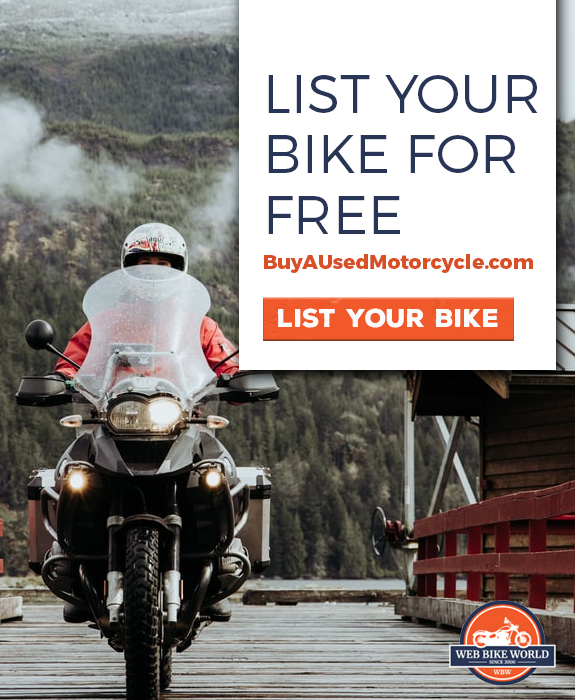Thank You, Wootton Bassett!
Wootton Bassett is a pretty market town in Wiltshire, in the south-west of England (Google Map). It has a half-timbered town hall and a 15th-century church, and is recorded in the Domesday Book. These days, however, Wootton Bassett is famous for a much more recent tradition.
Nearby is the RAF base at Lyneham. Here, the bodies of British soldiers fallen abroad are repatriated. On their way from the air base, the coffins pass through Wootton Bassett.
Members of the local branch of the Royal British Legion, a charity which supports past and present members of the armed forces, were the first to pay their respects to the fallen. Gradually word spread, and every time a repatriation takes place there is a larger crowd in Wootton Bassett awaiting the solemn procession.
Often only a couple of days’ notice is given, but word of mouth and the internet get the message out to the many faithful attendees. Plenty of these are bikers, some from the recently-established Riders’ Branch of the British Legion.
Politicians, however, have been politely requested to keep away. This is not an occasion for praising or blaming the government. And whatever your opinion on the conflicts abroad and Britain’s part in them, it’s impossible not to be moved by the ceremony.
Although some inhabitants don’t like their new-found fame, the majority of the population has welcomed the visitors and been proud to form part of this spontaneous ceremony.
On March 14th 2010, bikers from all over the country gathered to thank Wootton Bassett in return, as well as raising money for the Afghan Heroes charity.
Originally a rideout for a few friends, posted on Facebook, the event grew in size and support until ten thousand bikers had signed up with many more on a waiting-list. The route was planned, the police were informed, trained marshals volunteered to help out, arrival slots were assigned, and the plan took shape.
My boyfriend and I were scheduled to arrive between 11 and 12. Having travelled along country roads as far as possible, we hit the junction with the M4 motorway and were immediately surrounded by other bikes of all descriptions – plus a few bemused car drivers who really should have listened to the traffic news.
Progress was slow, but we rolled on to Hullavington airfield at 11:15 and were shepherded to our place in the outermost of ten or so ‘lanes’ of bikes.
The airfield, which operates gliders, had been completely given over to bikes for the day. The mass of motorcycles was the width of the runway and more than ten minutes’ walk from one end to the other. Behind this group were even more bikes whose riders hadn’t registered, waiting patiently for their turn at the end.
Taking the ten-minute walk revealed every possible type of bike and rider.
Astonishing custom trikes rubbed shoulders with the latest sportsbikes. A group of classic scooters looked tiny among the big bikes, like brightly-coloured insects. Riders ranged from the archetypal hairy biker bloke, leather waistcoat barely visible under all the patches, to young couples and fathers with their kid on the pillion.
Many of the bikes bore paper flags with the Afghan Heroes logo and the legend ‘Thank You’. Those mourning a personal loss had filled in a name under the ‘Thank You’.
All of these very different types had come together to show support for our troops and gratitude to the town that has come to symbolise our losses.
Once you’d admired the bikes on display, there wasn’t much to do but hang about, and not much clue as to when we would be moving (answer: as soon as I’d popped into the Portaloos, obviously).
Even when we got going it was only for a few yards at a time, resulting in lots of switching on and off and unhappy, overheating engines. We crawled painfully up to the front, and at last we were in the dispersal area and it was our turn.
Now things really got started. With police outriders and volunteer marshals in hi-viz escorting us, we hit the open road and flowed along in a stately 30 mph convoy of shiny plastic and metal, exhausts rumbling.
Both during the long wait and the ride itself, everyone’s behaviour was exemplary. No burnouts, no wheelies, no aggressive revving, just responsible, respectful riding – essential in such an enormous, tightly-packed group.
There was plenty of hooting and waving, however.
Not only in Wootton Bassett itself but in every village along the route, people lined the streets. It was now four in the afternoon and the bikes had been coming all day, but many of the spectators had obviously been in position for the whole thing.
They smiled and waved and gave us the thumbs up. There were St. George flags and signs that read ‘THANK YOU BIKERS’ and ‘BEEP FOR THE HEROES’. Small children held out their hands for high fives as we passed (which made me wobble). Cameras clicked; old ladies in wheelchairs beamed; a man held up his small doggie and made it wave its paw to us.
It was an extraordinary feeling – like being heroes ourselves, when all we were doing was honouring the people who had been truly heroic. We wanted to show our gratitude to Wootton Bassett, but here they all were thanking us!
In Wootton Bassett itself we slowed down to pass the war memorial, where a small group of veterans and local dignitaries stood. The bronze and marble edifice with its bright poppy wreaths was a sobering reminder of why we were here, after the fun of the ride.
Then we were through the town and dispersing. The solid mass of bikes broke up surprisingly quickly; if you had been on the M4 that afternoon you might have thought there were a few more motorcyclists about than usual, but probably put it down to the first sunny Sunday of spring.
The forty-five minute procession was well worth four hours’ waiting around. Expressing and receiving so much gratitude, being part of something involving more than ten thousand bikes and riders, was a truly unforgettable experience.
Plus, the rideout has raised over £100,000 for charity. The UK’s bikers can be very proud of themselves.



No Comment